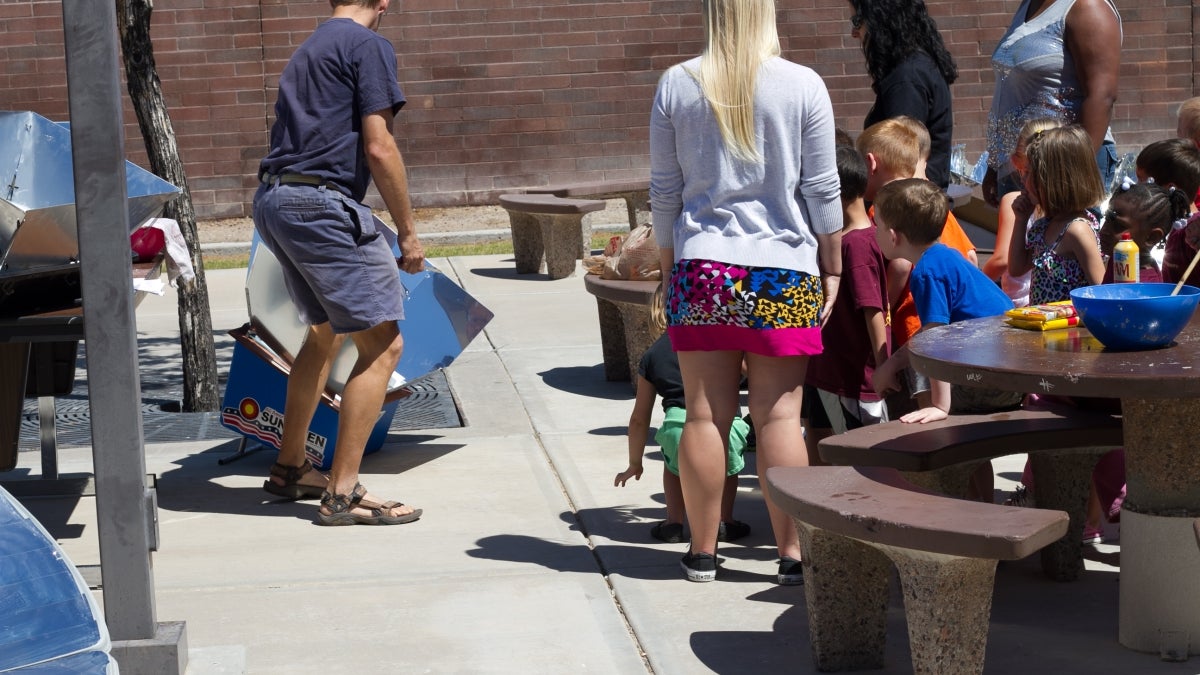ASU students provide sustainable solutions in K-12 schools

Shawn Fink bustles around the courtyard at Mountain Pointe High School. It’s the school’s Earth Day festival, and kids are engrossed in Earth-friendly learning activities.
Fink helped organize the event as part of his fellowship with Arizona State University’s Sustainability Science for Sustainable Schools program. Fink, an engineering graduate student with an interest in water scarcity, works with teachers at Mountain Pointe, helping them create and implement plans for sustainable projects.
But Fink is not just free labor for Mountain Pointe. He’s learning to manage and facilitate projects. He’s learning to resolve conflicts and get buy-in from teachers, administrators and community partners. He’s learning how to communicate about and engage young students in issues of sustainability.
Award-winning
It’s that kind of career-building experience that makes the Sustainable Schools program unique. The program received the 2013 President’s Award for Sustainability in a ceremony held April 18 in recognition of the collaborative and mutually beneficial partnership between ASU and more than ten Arizona K-12 school sites. The program also won a 2012 Environmental Excellence Award from Valley Forward.
Since 2010, the partnership has resulted in more than 100 sustainability projects. Over 5,762 Valley students have been taught sustainability lessons. Through it all, ASU’s graduate student fellows have gained real-world experience that empowers them to be better teachers of sustainability.
Applied experience
Monica Elser is one of the principal investigators for the National Science Foundation-funded Sustainable Schools initiative, now in its fourth year. At its core, the program works with teachers and school leadership to address sustainable school challenges by integrating sustainability into curriculum, campus infrastructure and community partnerships.
Elser is proud of the work the graduate fellows and their partner teachers are accomplishing. “It’s amazing the things that are going on,” she says. From events like Earth Day and No Impact Week, to teacher training and curriculum development, to Chevron Living Laboratories that implement real energy solutions on high school campuses, the fellows’ work covers a broad range of experiences.
Focusing on sustainability
While there are many exciting accomplishments the program can brag about, two in particular really illustrate how the program has managed to integrate sustainability into curriculum and instruction.
At Tempe High School, Sustainable Schools fellows and partner teachers have developed an Introduction to Sustainability course that focuses on the regeneration of the historic Hayden Flour Mill as an applied project. At Bioscience High School, the now-concluded Valley of the Sunflowers project beautified the neighborhood by planting sunflowers on a two-acre brownfield site, then used the harvested sunflower oil to power the school’s hybrid solar/biofuel vehicle.
A bright future
While Elser is pleased at the recognition that the President’s Award brings to the work she and her fellows are doing, she is more pleased to see the growing impact of the Sustainable Schools program.
“High school students will face real, complex sustainability challenges in their lifetimes.” When students learn about sustainability in their classrooms and through real projects implemented in their schools, she says, “it helps them see how sustainability applies to them, and how they can make a difference in the future.”

